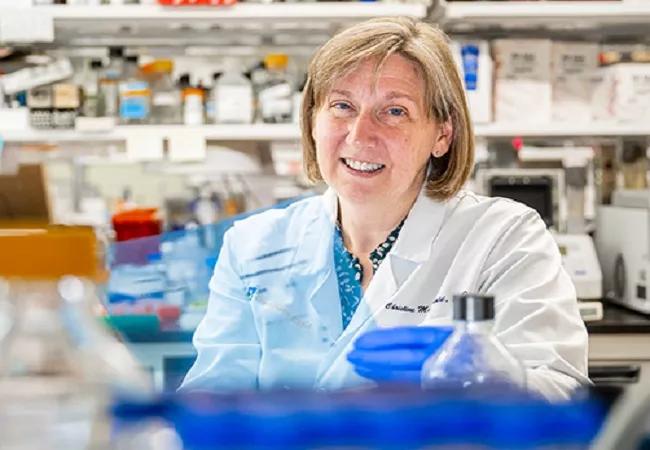Cleveland Clinic and Johns Hopkins collaboration could help meet need for new therapies

A team of researchers from Cleveland Clinic’s Lerner Research Institute, Johns Hopkins University School of Medicine and Johns Hopkins Drug Discovery has synthesized and tested a new class of gut-restricted oral therapies that shows promise in treating inflammatory bowel disease (IBD).
Advertisement
Cleveland Clinic is a non-profit academic medical center. Advertising on our site helps support our mission. We do not endorse non-Cleveland Clinic products or services. Policy
The researchers confirmed that a localized inhibitor targeting the enzyme glutamate carboxypeptidase II (GCPII), which is overexpressed in IBD, reduced monocytic inflammation in an animal model of colitis — a finding with translational significance that could help address the urgent need for new IBD therapies.
While improved treatments have been developed for two major forms of IBD, Crohn’s disease and ulcerative colitis, as much as 40% of patients with moderate to severe IBD do not adequately respond to existing drugs, and there are no current therapies that are effective for all patients.
“We’ve reached a therapeutic ceiling in IBD treatments,” says Christine McDonald, PhD, of the Lerner Research Institute’s Department of Inflammation and Immunity. “While some people have initial success with a certain drug, they often lose responsiveness over time. So, if a patient is diagnosed in their teens and lives into their 80s, the initial drug regimen will likely have stopped being effective — requiring a change in therapy, dose escalation with more side effects, or potentially surgical removal of intestine.”

Image content: This image is available to view online.
View image online (https://assets.clevelandclinic.org/transform/df4db09a-634f-452e-8982-9e0263ef0935/23-CCC-4212622-IBD-research-collaboration-650x450-1_jpg)
Christine McDonald, PhD, of Cleveland Clinic Lerner Research Institute’s Department of Inflammation and Immunity.
Dr. McDonald met Diane Peters, DVM, PhD, MS, assistant professor of pharmacology and molecular sciences at Johns Hopkins, at the GI Inflammatory Diseases Summit in 2019, and quickly recognized an opportunity to collaborate on moving the needle for new IBD therapies.
Initial discussions turned into a multidisciplinary collaboration, including the pharmacologic expertise of Barbara Slusher, PhD, MAS, Director of Johns Hopkins Drug Discovery, and Rana Rais, PhD, Director of Johns Hopkins Drug Metabolism and Pharmacokinetics. Their collaborative work to investigate oral inhibitors to GCPII was published in Science Translational Medicine.
Advertisement
GCPII is not normally expressed in the ileum or colon but is markedly overexpressed in the gastrointestinal epithelium of patients with Crohn’s disease and ulcerative colitis.
While previous evidence pointed to GCPII as a therapeutic target for IBD, existing GCPII inhibitors were not suitable for clinical translation due to poor pharmaceutic properties and the potential to affect the normal functions of GCPII expressed in the nervous system.
The challenge was to develop an oral GCPII inhibitor that would stay localized to the intestine and prove effective.
“When we discovered that GCPII was abundantly upregulated in the gastrointestinal epithelium of IBD patients, we became extremely curious about its function,” says Dr. Peters. “We were eager to collaborate with Dr. McDonald, an expert in human epithelial barrier structure and function. This collaboration yielded positive results, and we’re excited about next steps in our research working in tandem.”
Previous research had shown that a prototype small molecule GCPII inhibitor called 2-(phosphonomethyl) pentanedioic acid, or 2-PMPA, had strong anti-colitis effects when given systemically or as an enema in animal models of colitis.
Dr. McDonald and her colleagues suspected that a conjugation of 2-PMPA with a secondary bile acid — a metabolic byproduct that is thought to have anti-inflammatory properties and is in reduced levels in patients with IBD — could be an effective GCPII inhibitor.
The researchers synthesized several compounds containing common secondary bile acids and compared their effects in a mouse model of acute colitis. They found that an orally administered conjugate of 2-PMPA and deoxycholic acid called (S)-IBD3540 was superior to the other compounds in reducing disease activity. They confirmed that (S)-IBD3540 was restricted to the gut in healthy and colitic mice and that it was effective in reducing inflammation and disease severity. In patient-derived colon epithelial cells, the researchers found that (S)-IBD3540 protected against oxidative stress injury.
Advertisement
Collectively, the results justify continuing to develop (S)-IBD3540 as a drug for IBD, the researches determined.
Currently, the John Hopkins labs are working to translate these recent findings into human clinical trials. Next steps in the research will be to better understand the role of GCPII in the inflamed gut and validating the use of GCPII as a biomarker in IBD patient populations.
Data generated in the McDonald lab for this research was the work of András Ponti, who is currently a graduate student in the Cleveland Clinic Lerner College of Medicine Molecular Medicine PhD program. The research was funded by the Crohn’s and Colitis Foundation, CURE 4 IBD and the National Institutes of Health.
Advertisement
Advertisement

Insights from Dr. de Buck on his background, colorectal surgery and the future of IBD care

Findings help close the knowledge gap around VTE practice patterns

The Integrated Program aligns IBD care and research across Cleveland Clinic locations

Diet has a profound impact on how the intestine functions

Patients, caregivers and healthcare partners explore challenges during key transition points in care

Reassuring results, but patient education is still important

Insights on guiding treatment decisions

Underlying inflammation may cause higher rates of CV events